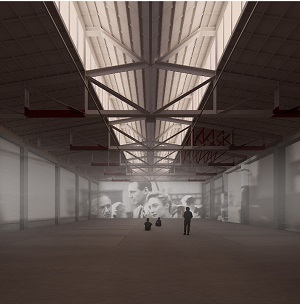
In May, a museum for Holocaust survivors will open in Schindler's factory in Brněnec
 |
"We have repaired the roof, we have repaired the ceiling, and by the end of October, we should have new floors completed. We have obtained a building permit, and at the beginning of next year, some work will take place in the interior," Šudoma stated. The foundation has already renovated the entrance gate to the complex and would like to create facilities with toilets from a promised contribution from the Pardubice region.
The museum, which will start operating to commemorate the 80th anniversary of the end of World War II, is likely not to be open every day. The exhibition will be accessible only on certain dates.
Last September, the foundation announced an international competition for an overall design transformation of the former factory premises in Brněnec. The vision of the Schindler’s Ark competition is to create a dignified memorial for survivors and to preserve the legacy of Oskar Schindler's camp by documenting and continuing the history of the Löw-Beer family and textile production in the region.
In the museum reconstruction category, the jury selected two projects. The first winning project was created by students Luxin Yu and Wencke Deitermann from the University of Stuttgart in Germany, focusing on the restoration and preservation of historical buildings. The second winning project was submitted by Alexandra Švarcová from the Faculty of Architecture and Design at STU in Bratislava, Slovakia, utilizing existing materials including "scattered tools, barrels, and wool." Current surfaces are to be sensitively reconstructed and included in the design.
A residential section is planned to be part of the premises. The winners of the Sustainable Housing category are Sibora Ramadani, Eron Shala, Bleranda Hykosmoni, and Albina Zenunaj from the University of Pristina in Kosovo. The jury praised the use of wood and textiles, as well as glazing for dividing space, and appreciated the modular design that would allow for more affordable housing for various family structures. According to Šudoma, the winners will be invited to create project documentation. In the future, the project is also expected to include a commercial center with large workshops for crafts production. Šudoma previously estimated the total project cost to be hundreds of millions of crowns.
The foundation also intends to build a so-called glass pavilion on the premises, primarily for educational activities. Some other buildings await renovation. From the original building where the workers slept, Schindler's Ark should be created, where Steven Spielberg's film Schindler's List and other documentaries or interviews with direct participants of the events of that time would be screened. Another space would be dedicated to the Löw-Beer family, who owned the factory before the war and recently regained the premises with the buildings. The exhibition will also cover Jewish history in Czechoslovakia. The complex also contains the so-called Germans' building, where German soldiers resided, and the building where Schindler had his office. Part of the complex could be converted into a park.
The factory in Brněnec was originally founded as a paper mill, later serving as a wool spinning mill, from which the then-owner Izák Löw-Beer gradually built a significant textile factory. During the war, it was converted into an ammunition factory, and Brněnec became a subsidiary camp of the Groß-Rosen concentration camp. German businessman Oskar Schindler moved about 1,200 workers from his enamel factory in Poland to the factory, saving their lives. However, many perceive Schindler as a controversial figure, not just as a hero and savior of Jews. He was also a member of the Nazi Party and the German military intelligence service.
After the Nazi invasion of Poland, Schindler acquired a former Jewish enamel factory in Krakow, and since it was cheaper, he hired Jews from the Krakow ghetto there. However, the ghetto was liquidated, and its residents were either murdered or deported to the Plaszow concentration camp. When it was decided that all prisoners would be transported to Auschwitz, Schindler used bribes and contacts to ensure that not only his employees but also their families were transferred to his other factory, the ammunition factory in Brněnec, Moravia. Before his death, he saved around 1,200 Polish Jews. After the war, he unsuccessfully tried to run a business and became a recipient of many awards. He died in 1974 in Germany and was buried in Israel.
The textile factory in Brněnec was operated by Vitka company after 1989. When it went bankrupt in 2004, the Bustrex company purchased it and renamed it Vitka Textiles. In 2011, it went into bankruptcy, production was halted, and the premises have been abandoned since then. The foundation purchased it in 2018, and some buildings are protected as historical monuments.
The English translation is powered by AI tool. Switch to Czech to view the original text source.
0 comments
add comment
Related articles
0
04.09.2023 | The foundation announces a competition for the transformation of the former Schindler's factory into a museum
0
16.01.2023 | The Schindler's Ark Memorial in Brněnec could open in 2025
0
04.09.2020 | The foundation had a design prepared for the Schindler's Ark memorial
0
20.10.2016 | The buildings of the concentration camp in Brněnec are a cultural monument








